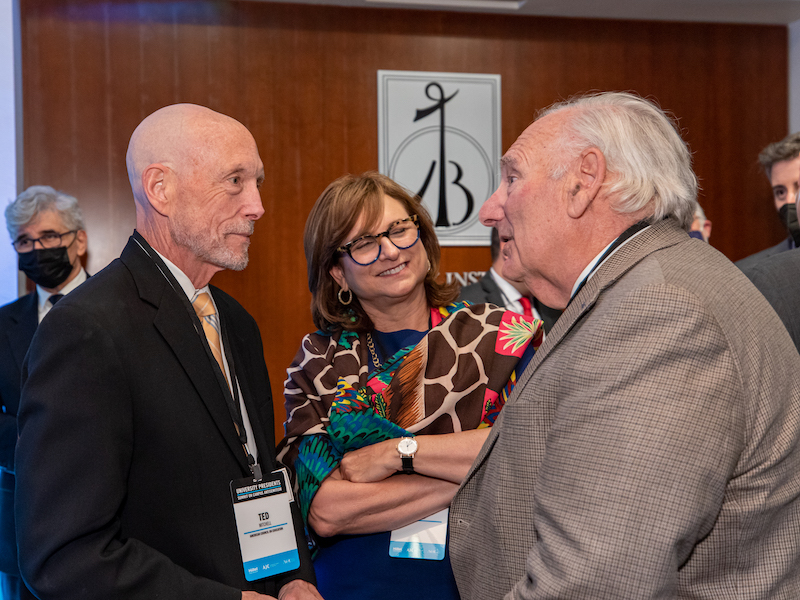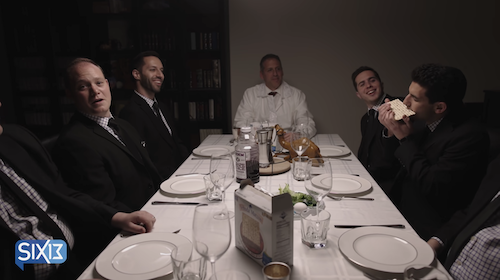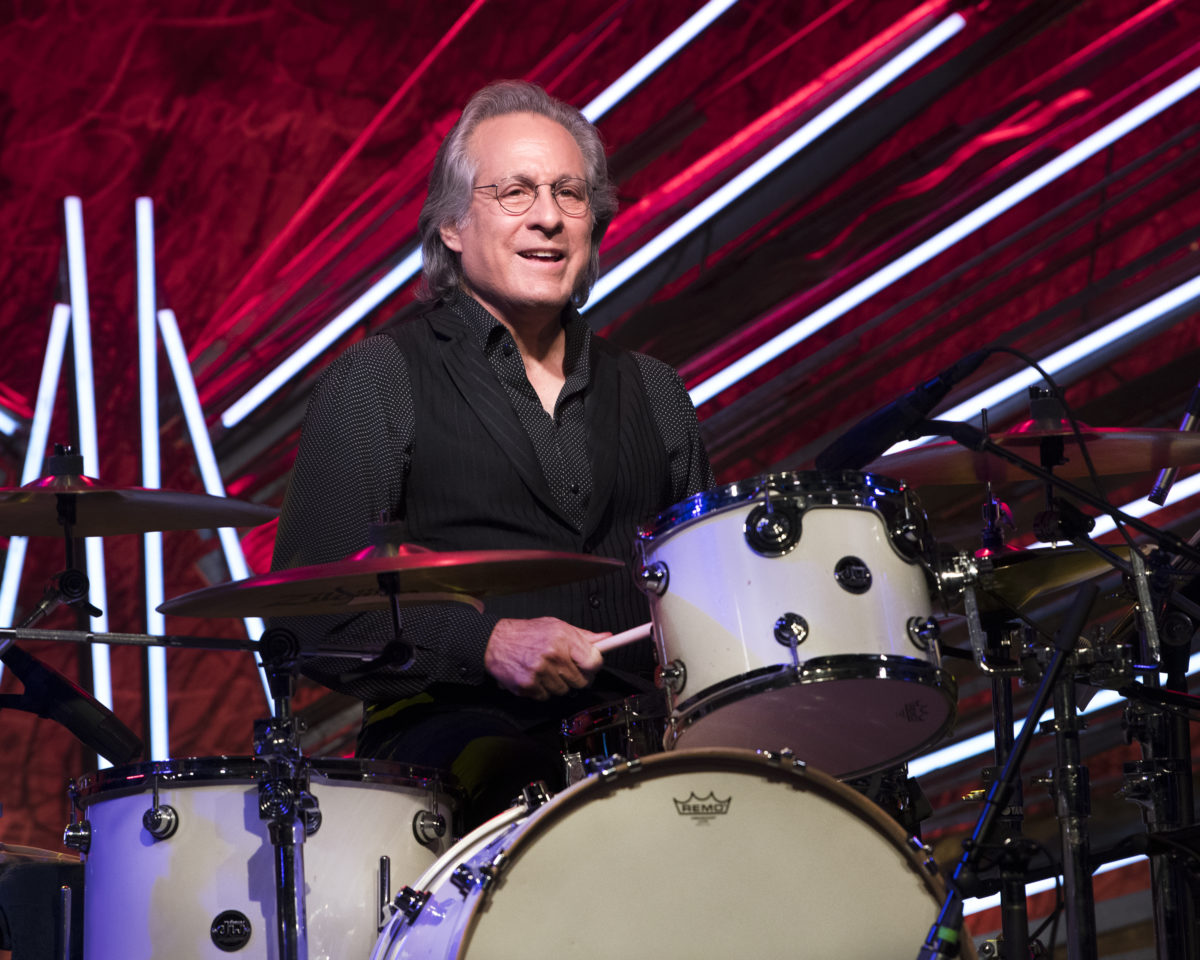Your Daily Phil: University presidents talk antisemitism + Borscht at the Seder
Good Wednesday morning!
Rachel Brodie, a Jewish educator who called herself a “New Yorker by birth and temperament,” but who became a leader in the Bay Area’s Jewish community, died on Monday.
Brodie’s death was announced in an email sent Tuesday morning from Congregation Netivot Shalom, a Conservative synagogue in Berkeley, Calif. The email and other announcements did not include the cause of death. Brodie graduated from Brown University in 1989, moved to the Bay Area 25 years ago and worked in a range of Jewish institutions. She served as chief Jewish officer of the JCC of San Francisco, and co-founded and led Jewish Milestones, a nonprofit focusing on lifecycle events. Most recently, she served as senior educator at the Jewish Studio Project, which combines art with Jewish study.
“She was a dear teacher to countless grateful students, of which I was humbled to count myself,” Rabbi Menachem Creditor, the former rabbi of Netivot Shalom, wrote on Facebook. “She was my sister in profound ways, and I am grieving to my heart.” Creditor, who now works at UJA-Federation of New York, told eJewishPhilanthropy that Brodie was the person who convinced him to come to Netivot Shalom. “She was just extraordinary,” he told eJP.
The Jewish Studio Projectmourned Brodie as a “beloved teammate, dear friend, and teacher” in a Facebook post. “To be in Rachel’s presence was to be illuminated by her wit, her laughter, and her fierce and tender heart,” the post said. “To learn with her was to be stimulated, delighted, and transformed”
Brodie served as a scholar-in-residence and educator at Jewish spaces around the Bay Area. During her time in New York, she was the founding director of the Jewish Retreat Center. She also worked for the American Jewish Joint Distribution Committee in Bulgaria.
top brass
Nearly 40 university presidents gather to discuss combating campus antisemitism


Ted Mitchell, president of the American Council on Education (left) speaks with participants at a meeting of college presidents to discuss combating campus antisemitism.
When Jewish college students and the national organizations that aim to speak in support of them encounter antisemitism or anti-Zionism on campus, they often see the office of the college president as their last, best hope. On Monday and Tuesday, nearly 40 of those college presidents — including some from campuses that have seen high-profile anti-Israel or antisemitic activity — gathered at the Center for Jewish History in New York City to share best practices in combating antisemitism, reports eJewishPhilanthropy’s Ben Sales.
Hotspots: Some of the universities that were represented have been the subject of federal complaints alleging that their campuses were hostile to Jewish students — including New York University, the City University of New York, the University of Illinois at Urbana-Champaign and Columbia University. Others, like Tufts University, have seen incidents in which national organizations offered legal assistance and a public platform to Jewish students alleging discrimination. “It is a stain on our institutions that antisemitism persists and that we are here in 2022,” said Ted Mitchell, president of the American Council on Education, which organized the gathering along with the American Jewish Committee (AJC) and Hillel International.
Off-the-cuff: The gathering was intimate by design, largely closed to the press and without a public program. Instead, the university presidents spoke to each other about their experiences, and joined discussion groups to talk through different approaches to combating antisemitism. University of Illinois Chancellor Robert Jones spoke to his peers at lunch on Tuesday in what he described to eJewishPhilanthropy as an “off-the-cuff” speech for which he hadn’t prepared remarks.
Federal investigation: Jones’ school was hit with a Department of Education investigation of alleged antisemitism in late 2020. Days later, the university released a statement co-signed by the school’s Hillel, Chabad, the Chicago Jewish federation and other stakeholders pledging to fight antisemitism. Jones would not comment to eJP on the status of the federal investigation but said that the school has set up a council of faculty, students and Jewish communal stakeholders to address and seek to prevent antisemitism on campus, including an educational curriculum on antisemitism. “All of my senior leadership has had to go through the educational program, and every level of my administration — all the way through the dean and the provost… all the way through students,” he said.
Lessons learned
Chicago’s Board of Jewish Education turns 100


Aerial panoramic cityscape of Downtown Chicago with the shoreline of Lake Michigan.
“The Midwest in the early 1900s was a spiritual wasteland with a nominal Jewish presence at best. If the fledgling community was to stand a chance of survival, it was clear that there was a great deal of organizing required to make it viable,” writes Sherwin Pomerantz, a former president of the Board of Jewish Education of Metropolitan Chicago, in an opinion piece for eJewishPhilanthropy.
A century of Jewish education: “The BJE took responsibility for developing curricula and overseeing the religious instruction in the city, primarily in non-Orthodox educational institutions. Over the years, the BJE has fulfilled its purpose by creating summer camps, early childhood education centers, teacher-training programs and many Jewish learning opportunities for people of all ages and backgrounds. Today, as it approaches its 100th anniversary, the Board of Jewish Education of Metropolitan Chicago continues to offer many opportunities for Jewish education through its early childhood education centers and its groundbreaking JTeach[dot]org program. The BJE’s success and longevity is testimony to its importance in the life of the Jewish community.”
Meeting changing needs: “Of course, Jewish education has changed over these last 100 years, along with the perceived needs of the Jewish community, the increased mobility of our people and the arrival of the digital age. As a result, the BJE has had to change as well and its JTeach[dot]org program is emblematic of its ability to pivot in line with current needs and digital opportunities. JTeach[dot]org capitalizes on technologies available today that were unknown just a few years ago. The program encourages and enhances vibrant contemporary Jewish living through original and innovative pedagogic connections to thousands of years of Jewish wisdom by providing content-rich activities used both by experienced and new educators alike.”
Taste the soup
Is it time to add borscht to our Seder plates?


Vegan Borscht Soup. Ingredients: beets, cabbage, carrots, onions, crushed tomatoes, vegetable bouillon, vinegar, bay leaves, dill, salt and black pepper, garnished with a dollop of non-dairy yogurt and dill
“Our Seder plate — filled with the shank bone (zeroa), egg (beitzah), bitter herbs (maror), vegetable (karpas) and charoset — has grown over time to include additional foods that symbolize and recognize the injustice and disparities of so many other cultures, races, countries and religions. Whatever we add, the idea is to inspire genuine curiosity from our children. We want them to ask, we want them to explore and we want to inspire action,” writes Michael Witman, director of Family Life and Learning at B’nai Jeshurun in New York City, in an opinion piece for eJewishPhilanthropy.
Reminding ourselves of refugees: “This year, we enter Pesach with heavy hearts, thinking of all the refugees from Afghanistan and Ukraine who have been displaced from their homes and have lost those dear to them. The Torah teaches us, ‘You shall not wrong or oppress a stranger, for you were strangers in the land of Egypt’ [Exodus 22:20]. So what can we add to our Seder plates this year to remind ourselves of the ‘stranger,’ of those unfortunate refugees? To remind us that slavery is still an ongoing issue, and that so many are suffering in our world? And how can we take action to try to mend some of these problems as a family?”
Just beet it: “In light of recent world events, one thing we can add to our Seder plates this year is borscht. Yes, you read that correctly: the magenta, dill-filled, tasty beet soup. As war and destruction continue to threaten our free world and take the innocent lives of Ukrainian citizens, let’s hold them close to us this Pesach by adding this delicious traditional Ukrainian dish to our Seder plates.”
Worthy Reads
Personal Touch: Donor engagement can be complicated, Michael Gorriarán writes in NonProfitPRO, and a depersonalized donor experience damages donor retention. “Direct mail, email, telemarketing and online solicitation channels are often managed by separate internal organizations and entirely different fundraising agencies. As a result, donors are engaged in multiple ways, frequently with different appeals and solicitation amounts. This fragmented donor communications experience is a pernicious problem in the nonprofit industry… The goal of an optimized experience is to maximize a donor’s lifetime value, not the value of a single gift. This can be accomplished by determining the optimal level of giving, not the highest. Increasing lifetime giving is only effective if you have strong insight on donor sentiment, and personalization leads to more engaged donors who remain active for a longer period of time.” [NonProfitPRO]
Empathy or Vigilance at Seder?: In previous years, her family focused on the message of being empathetic toward the stranger, but perhaps a shift of focus is called for this year, Abigail Pogrebin writesin The Atlantic: “I don’t subscribe to the fear, heard in some Jewish circles, that it’s 1938 all over again. But I have also never in my lifetime watched Jews painted so starkly as master manipulators, oppressors, colonizers, even Nazis, excluded from progressive efforts for social justice. I never imagined that I’d see signs blaring Zionism is terrorism, or flyers left on doorsteps blaming the pandemic on a Jewish plot. I find it mind-boggling that white supremacists have even found a way to blame the Jewish president of Ukraine for engineering a war to get white Europeans killed. The ground has shifted, and Passover must too. I’m struggling this year to reconcile the lessons I’ve taken from the holiday: to help the world, but also to remember how often the world has turned on us. Maybe the seder needs to be a call not only for empathy but also for vigilance.” [TheAtlantic]
The Power of Jewish Questions: Washington Hebrew Congregation’s Rabbi Aaron Miller is taking Jewish literacy beyond “the I and the Two H’s” — Israel, the Holocaust and the holidays — with 12 Jewish Questions, a 12-week, twice-yearly series that asks some big questions, such as “Do you need to believe in God to be Jewish?” “How is Judaism linked to Israel?” and “How can I heal the world?,” Alex Krutchik reports in the Washington Jewish Week: ??“On the one hand, there could be easy answers, but we never go to the easy answer,” Miller said. “We dive into thousands of years of discussion and debate the real conflict before we even land on any kind of answer. We always appreciate the power of a good question,” he added. “And a good question for Jews is often even better than a good answer.” [WashingtonJewishWeek]
Word on the Street
The Shine a Light campaign, which provides education about antisemitism, was named a Shorty Awards finalist…
Sallai Meridor, former Israeli ambassador to the U.S., has been appointed chairman of the National Library of Israel…
The Community Security Initiative (CSI), which coordinates security for Jewish institutions in the New York City area, circulated a “threat bulletin” on Tuesday warning that the recent string of terror attacks in Israel “could have a secondary effect on diaspora Jewish communities worldwide, also making them targets of anti-Israel and antisemitic sentiment that could result in violence”…
CSI Executive Director Mitch Silber told eJewishPhilanthropythat it was unclear whether Tuesday’s shooting on the subway in Brooklyn was connected to a rise in antisemitic attacks, but added that he feels “the Jewish community in New York is in a high state of anxiety” due to antisemitic attacks in the area…
The Jewish Museum London appointedFrances Jeens, who has been interim director for two years, as its director as part of its 90th anniversary celebrations…
Jewish comedian Gilbert Gottfried died at 67. Gottfried provided the voice of Iago the parrot in Disney’s animated film “Aladdin,” and appeared in “The Last Laugh,” a documentary film about comedy and the Holocaust…
Julee Levine was named director of education at Beth Sholom Synagogue in Memphis, Tenn. She had previously served Adat Ari El Synagogue in Valley Village, Calif., as director of supplemental education for 19 years…
Pic of the Day


The Jewish a cappella group Six13’s latest video, pictured here, is a Passover-themed tribute to Billy Joel.
Birthdays


NEW YORK, NY – JULY 11: Max Weinberg performs during Max Weinberg’s Jukebox at Sony Hall on July 11, 2019 in New York City. (Photo by Debra L Rothenberg/Getty Images)
Longtime drummer for Bruce Springsteen’s E Street Band and the bandleader for Conan O’Brien on “The Tonight Show,” Max Weinberg…
Resident of Rancho Palos Verdes, Calif., she spied on the Nazis for the French Free Forces in the latter days of World War II, Marthe Cohn… Curator and former director of the Louvre, Pierre Rosenberg… Geneticist and Nobel Prize laureate in medicine, Michael Stuart Brown… Author and former CEO of Planned Parenthood Federation of America, Gloria Feldt… Managing director at Tiedemann Advisors, Robert D. “Bob” Hormats… Retired member of the U.S. House of Representatives after 10 terms, Susan Carol Alpert Davis (D-CA)… VP of the New Israel Fund, Paul Egerman… Actor who won a Golden Globe for his portrayal of Vincent in the television series “Beauty and the Beast,” Ron Perlman… Partner in Uplands Real Estate Partners, Deborah Ratner Salzberg… Former member of the U.K. Parliament and the U.K.’s first-ever minister of state for asylum and immigration under then-PM Tony Blair, Barbara Roche (née Margolis)… Co-founder of Highbridge Capital Management and a founding board member of the Robin Hood Foundation, Glenn Dubin… Author of six books and co-host of “Democracy Now,” Amy Goodman… U.S. Sen. Bob Casey, Jr. (R-PA)… Former orthopedic surgeon, he is a candidate for Alaska’s at-large House seat, Alan Stuart Gross… Youngest-ever Federal Reserve governor from 2006 to 2011, Kevin Warsh… Guitarist and founding member of the rock group Staind, Aaron Lewis… CEO and executive director of D.C.’s Sixth & I, Heather Moran… Director of government affairs at CUFI, Alexandria Paolozzi… Operations and growth strategy officer at Peregrine, Morgan Hitzig… Director of development at the America-Israel Cultural Foundation, Lauren Epstein… Aharon Lipnitzky…
Email Editor@eJewishPhilanthropy.com to have your birthday included.








